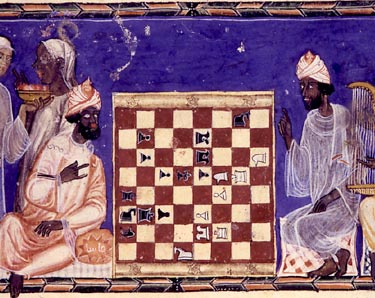
Chess originated in India and made its way to Europe via the Persians and Arabs. It symbolizes the world as the play of divine powers with their respective armies of light and darkness: devas vs asuras, gods vs titans, or angels vs demons. Thus Chess is a game for Kshatriyas, or Warriors.
The king represents the Heart, or Spirit, while the other pieces represent the various faculties of the soul. The movements of the pieces correspond to the realization of cosmic possibilities represented by the chessboard, actually a type of mandala: the castles are masculine, the bishops feminine, and the jump of the knights is intuition.
Much is lost today, since few any longer have the patience to play or even the ability to understand chess. Instead, energy is devoted to computerized games, which don’t represent the cosmic law, but rather the imaginary world construction of the game designer. Thus the will and intelligence of the player is secondary to the skills of the designer.
Chess, on the other hand, represents the ability of the player to make his own destiny based on his intelligence and will. Titus Burckhardt describes it:
At each stage of the game, the player is free to choose between several possibilities, but each movement will entail a series of unavoidable consequences, so that necessity increasingly limits free choice, the end of the game being seen, not as the fruit of change, but as the result of rigorous laws.
While the player freely chooses his moves, they must be in conformance with the nature of the game. This applies, too, to our lives, which are played out in the world and need to conform to cosmic law, or Logos, to be successful. Only this gives us the freedom to create our destiny, as we can see that the outcome of the game is related to the choices we make. Burckhardt concludes:
The royal art is to govern the world—outward and inward—in conformity with its own laws. This art presupposes wisdom, which is the knowledge of possibilities; now all possibilities are contained, in a synthetic manner, in the universal and divine Spirit. True wisdom is a more or less perfect identification with the Spirit (purusha), this latter being symbolized by the geometrical quality of the chessboard, seal of the essential unity of the cosmic possibilities. The Spirit is Truth; through Truth, man is free; outside Truth, he is the slave of fate. That is the teaching of the game of chess; the Kshatriya who gives himself over to it does not only find in it a pastime or a means of sublimating his warlike passion and his need for adventure, but also, according to his intellectual capacity, a speculative support, and a way that leads from action to contemplation.
REFERENCE: “The Symbolism of Chess”, by Titus Burkhardt, included in “Mirror of the Intellect”.
This leads to an interesting thought experiment. Give the primordial state (i.e., the initial position on the chess board), how did we get here, and who is directing the moves?
It occurred to me that a game of chess can serve as a symbol for history and occult warfare: conscious agents directing their forces in ever more determined ways. A rough symbol, of course, since in real life there are no artificial beginnings or endings, and many more possible moves.
Now that I have discovered that there is a Titus very much worth reading…thanks Gornahoor!
I’m sorry but I thought above that Titus was the one who posted the snippet! Ignorant me!
Titus you’re smart–most people don’t even know that chess originated in India–
Today however Indians don’t produce much that is interesting after being under the Muslims for 700 years and then the British…all the glory and creative phase was before the semitization of India with the introduction of Middle Eastern religions such as Islam and Christianity which tells you that something terrible happened such that a productive, unique culture was destroyed such that it survives today in a spastic, sickly form…There is a spark still left there that has not quite died out despite the disruptions…Chess is a beautiful game….
Chess seems like something that could survive the end of the current cycle. Although the modern spirit has thoroughly “professionalized” the sport and made the game when played in that context about memorization as opposed to contemplation, once the knowledge that has broken the game is forgotten it could become a tool for displaying true achievement again. Either that, or a new variant could become popularized, as I’m sure the Indian version was different than the one that became known in the Holy Roman Empire.